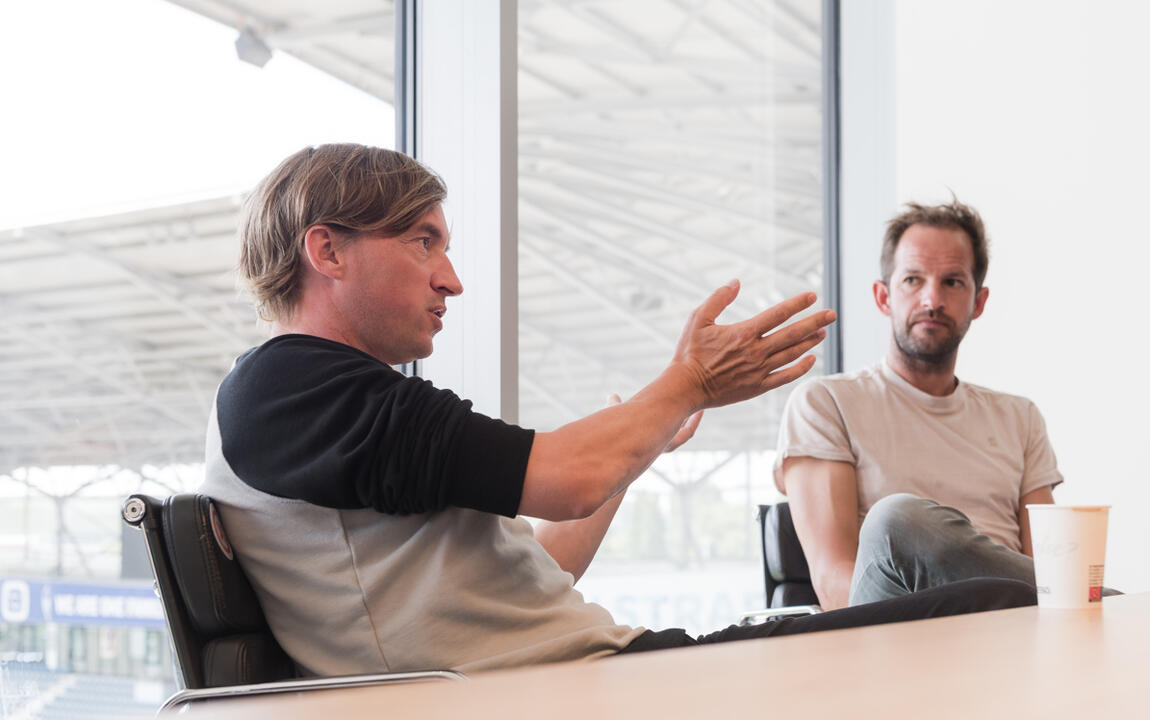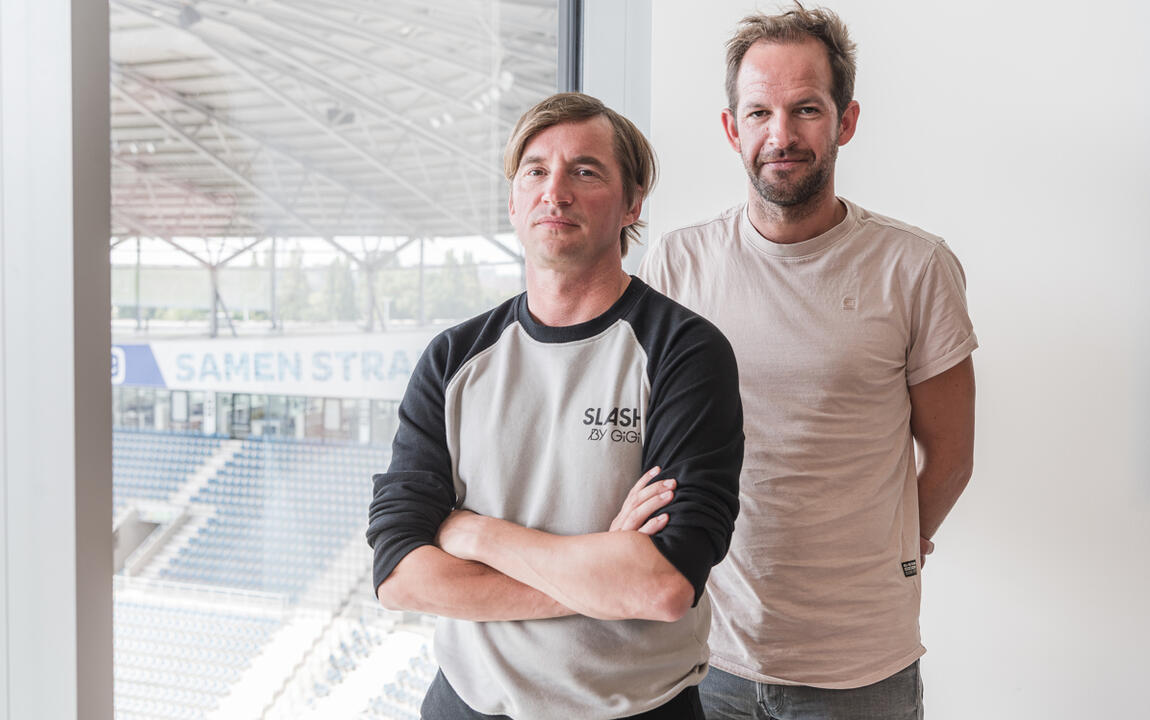Ghent's MOLECUBES wins the Export Lion Award
Ghent's MOLECUBES wins the Export Lion Award & wants to conquer the medtech world with miniature cubes for preclinical imaging.
In 2016 Ewout Vansteenkiste, Roel Van Holen and 4 colleagues put their heads together. Their aim for MOLECUBES was to conquer the medtech world with their compact PET, SPECT and CT scanners for laboratory animals. Five years later, MOLECUBES wins the ‘Leeuw van de Export award’ (Export Lion Award) 2021 from Flanders Investment & Trade. The City of Ghent seized the opportunity to hear its story from founders Ewout and Roel.
MOLECUBES is the result of the opportunity created at Ghent University and the desire to do business.
What was the motivation behind the creation of MOLECUBES?
It wasn’t a coincidence that MOLECUBES, a Ghent University spin-off, was looking for proximity to Ghent University Hospital (UZ Gent). For around 10 years already, UZ Gent had a preclinical imaging lab, INFINITY, where research was being conducted on laboratory animals, new tracers, syndromes and disease patterns. Roel was actively researching new hardware. With his backpack full of knowledge from the United States, he was looking for systems to visualise laboratory animals.
We concluded that the solutions from (European) competitors were inadequate. We felt we could do better, especially in terms of usability, compact design and accessibility of the system. The technology existed and we had the drive coursing through our veins. We knew that Ghent, and by extension Flanders, had the right knowledge for us to achieve our goals.
The rollercoaster started when, as a group of 6, we gathered the financial means to get started. Today – 5 years later – we run a company of about twenty employees that brings these systems to market all over the world.
Co-founder and CEO Roel Van Holen likes to add that the creation of MOLECUBES is the result of the opportunity created at Ghent University and the desire to do business. “The burning desire to do business was always there throughout my university career, and gave me the fuel to make it happen.”
What does MOLECUBES do exactly?
Based on new technology, we make – from the bottom up – preclinical scanners in miniature format to look inside the bodies of laboratory animals. In contrast to microscopic work, we do this in vivo and in 3D. Our scanners provide biologists with a user-friendly tool that can sit alongside their microscope. With these scanners we facilitate and accelerate preclinical research and make the transition to humans more efficient and cheaper.
The founders of MOLECUBES have since set up a second company. XEOS develops clinical scanners for operating theatres that immediately show whether the complete removal of a tumour has been a success. In normal pathology, this takes days or weeks. In 2017 we conducted the pilot study on twenty patients to determine whether our idea was scientifically relevant. We now employ seventeen people.
What does the ‘Leeuw van de Export 2021’ award (Export Lion Award) mean to you?
As a business developer, Ewout sees the award mainly as recognition, given that it’s based on objective figures. It is a great acknowledgement for MOLECUBES, that as a young Ghent company generates most of its turnover abroad. “In the past, the candidates were mainly traditional firms. Today we show that a young company can also earn this award.”
Co-founder Roel uses the award as an opportunity to look back on what they’ve achieved. “It makes me proud to see the confirmation of our culture. The award also means a lot to our suppliers. They contribute to our success and are deeply invested in it.”
Ghent is incredibly well connected, which plays a role that’s not to be underestimated.
How much of an advantage is MOLECUBES’ Ghent location?
Ghent is a great city with a nice city centre. When most international visitors first come to Ghent, they’re pleasantly surprised. The fine-dining restaurants and good-quality hotels are ideal for welcoming visitors to Ghent. For guests from the United Kingdom, a football match is always on the programme. Without doubt, our location in the MeetDistrict Ghelamco Arena has a real wow effect.
“At the same time it’s also difficult – in countries like the United States – to make it clear where Ghent is. For me the biggest advantage lies in the proximity to the airport and the ability to ship products easily. Ghent is incredibly well connected, which plays a role that’s not to be underestimated”, adds Ewout.
Doing business in Ghent means ticking all the boxes. MOLECUBES is home to a mix of West Flemish and Ghent residents who are living their lives here. Studying, living, working, doing sports, going out, catching a football match… Everything is going on in Ghent. This is extremely important when we’re thinking about new employees. Our location near Ghent University helps us attract good people. After all, the younger generations are picky about where they want to work. Ghent offers the whole package, which makes them really enthusiastic about working here.
MOLECUBES exports worldwide from Ghent. What tips do you have for other companies?
We advise everyone not just to focus on R&D in the initial phase, but to travel around before launching a product. This is the only way to learn how other cultures view it and whether they’re open to it. We consider it an absolute must to verify the existing market reports in person.
Roel also advises founders to get out there personally. “Only you can show that strong drive and inspiration to put your company on the map. Be present in the countries where you want to launch your product, and surround yourself with like-minded people.”
What assets does Ghent have to grow into a European region of reference in the field of medtech and healthtech?
The presence of Ghent University and various start-ups and scale-ups in the area is an important factor. These companies growing and producing creates a lot of opportunities. After all, you need that leverage. That’s how it happened in biotech.
The easy accessibility of Ghent and the necessary financing around Ghent are also important aspects. At the same time, companies leading the way play a big role. The medtech start-ups of ten years ago are gradually evolving into scale-ups. And that’s crucial. It brings about a mutual exchange of information that promotes real acceleration.
If Ghent succeeds in creating a kind of medtech belt, it will overtake Leuven and Brussels to reach the level of Aachen and Eindhoven.
The City of Ghent focuses its policy on specific spearheads such as healthtech, biotech, cleantech, digitech and innovation. How can the City of Ghent support medtech companies even more?
The founders of MOLECUBES agree that the biggest challenge for the City of Ghent is housing. The physical proximity of medtech companies is essential for creating a snowball effect. A bit like what happened for biotech in Zwijnaarde.
The City of Ghent knows better than anyone where companies are located and has unique locations to bring them together. Ewout believes this should be the City of Ghent’s ambition. “If Ghent succeeds in creating a kind of medtech belt, it will overtake Leuven and Brussels to reach the level of Aachen and Eindhoven.”
What’s your top tip for people wanting to start a business in Ghent?
Speak to people. Ghent is a source of accessible entrepreneurs who – certainly in medtech – are happy to share their experiences. This will build up your network quickly. And hang in there. Be persistent and you’ll eventually find the right people and resources to get there.
Discover Invest in Ghent
Eager to do business in Ghent, just like MOLECUBES? The Invest in Ghent team is ready to help you start or scale your business in Ghent through expert local guidance and introductions to growth opportunities.
Get in touch with our investment advisors

